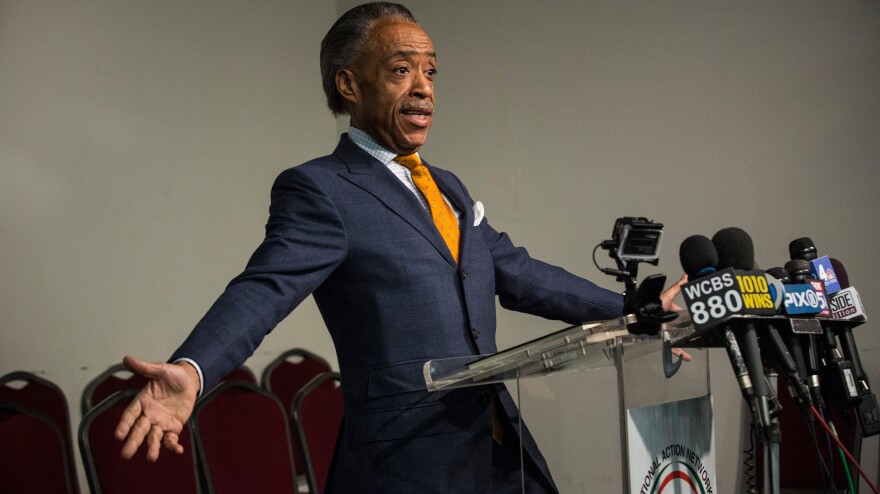The Rev. Al Sharpton says he isn't a former FBI asset who informed on Mafia figures to a special task force in New York City during the 1980s. Responding to a report by The Smoking Gun, Sharpton says he was never an informant and that he went to the FBI after being threatened by mobsters entrenched in the music business.
"The claim is I helped get the mob, not that I was in the mob," he told The New York Times on Monday. "I was never told I was an informant."
Sharpton held a news conference Tuesday to respond to a lengthy report by The Smoking Gun that identifies him as "CI-7," or confidential informant 7, who reportedly used a customized briefcase outfitted with a microphone to record mobsters discussing their dealings.
And the reverend, who is now a regular TV presence who analyzes U.S. politics and society on MSNBC and other networks, told several news outlets Monday that the idea of him working for the FBI to bring down mob figures doesn't stand up, essentially calling it an overblown version of an old story.
Sharpton says the report exaggerates his role, which he says was already public knowledge.
"If I brought down the mob," Sharpton told The Daily Beast on Monday, "I want my ticker tape parade."
Speaking to New York's WCBS Radio on Monday, Sharpton offered what he called a reason for The Smoking Gun's timing of the story's publication:
"They know that President Obama is speaking at my convention this week and (U.S. Attorney General) Eric Holder is speaking, and they're just trying to get some attention, because at the end of the day, I'm not accused of committing a crime. So are you saying it's scandalous for me to help the good guys? It's crazy."
The complex tale laid out by The Smoking Gun touches on several icons of 1980s New York, from influential music label Sugar Hill Records to boxing promoter Don King, and from Sen. Al D'Amato to Vincent Gigante, a Mafia boss also known as "The Chin." Sharpton's role in helping controversial figure Tawana Brawley is also mentioned.
The FBI received information from Sharpton about four of New York's crime families, The Smoking Gun says, based on his connections to a world populated by people with nicknames like "Fat Tony" and "Benny Eggs."
Investigators used information from Sharpton's recordings to obtain search and surveillance warrants, The Smoking Gun says, noting that Sharpton did not testify in court — and saying that in at least one case, agents tweaked documents to ensure his identity was not revealed to dangerous criminals.
Sharpton told The Times that the documents and other information posted by the website "does not remind me of anything I was involved in."
The Smoking Gun says its story about Sharpton and the FBI is based on "hundreds of pages of confidential FBI affidavits, documents released by the bureau in response to Freedom of Information Act requests, court records, and extensive interviews with six members of the Genovese squad, as well as other law enforcement officials to whom the activist provided assistance."
The website posted dozens of those documents, ranging from NYPD records to FBI affidavits. One of the affidavits includes an appraisal of the figure called CI-7, stating that his "information has never been found to be false or inaccurate."
Copyright 2021 NPR. To see more, visit https://www.npr.org. 9(MDAxNzg0MDExMDEyMTYyMjc1MDE3NGVmMw004))







